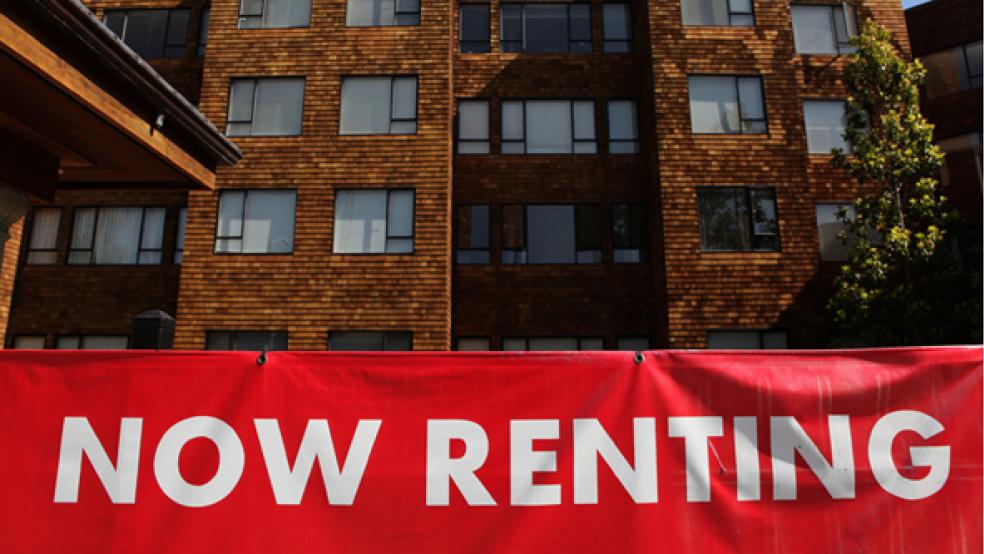One effect of the housing market’s collapse has been to turn thousands of homeowners into renters. As owners lost homes to foreclosure or sold properties they couldn’t afford, the homeownership rate has dropped– it now stands at 66.2 percent, lower than any time since 1997. But this has created a huge demand for rental apartments and houses. Rental vacancy rates fell to 9.5 percent for 2011, the lowest level since 2002.
Even so, all markets are local, with cities on the coasts generally seeing the lowest vacancy rates – at the bottom is New Haven, Connecticut, with a rate of 2.1 percent, according to Reis, a provider of commercial real estate data. Nationwide, that tight market drove up rents almost 2.5 percent last year.
RELATED: 12 Markets Where It’s Better to Rent
But competition for apartments can trap renters into the scarcity mentality that helped fuel the housing bubble in the first place: ‘If you don’t act now, you’ll never find another place this good at this price,’ goes the thinking. And while you may have to look longer when rentals are less plentiful, it’s still better to think long term. Though all state rental laws vary, and single family home rentals can differ from large apartment complexes, in general, here are some costly mistakes to avoid when renting:
1. Signing a lease without reading it carefully. No matter how frenzied the market is, don’t rush into a rental agreement if something doesn’t feel right. One example: does the fine print stipulate that you have to pay extra for utilities, water, or parking? Or was it sold as “included” by the real estate agent? That means taking the document home and having an attorney, or a friend or family member who has more renting experience than you, read it over. To make sure the lease doesn’t violate your tenant rights, check out the Department of Housing and Urban Development’s website, which provides a state-by-state list of what’s legal. Eric Feinberg, a New York City-based tenant lawyer, says, “I can’t tell you how many people knew when they were signing that it felt wrong and how much more it cost them in the end.”
2. Signing an undesirable lease. Think you might sublet in the future? Have pets? Or frequent visitors? Think about your lifestyle and what you need in a rental. Some leases will charge you extra for guests who stay more than two days, forbid subletting, or make the cost of repairs your responsibility, including problems that pre-date the term of the lease (lawyer Senen Garcia reports seeing the latter in Miami where he’s based). These are details you’ll want to carefully go over before signing, and if items are there that you don’t like, try negotiating with the owner to have them removed.
3. Not taking pictures when you first move in. Almost everyone has a digital camera or cell phone these days and should use it to document the state of the property at move-in time. You’ll also want to note pre-existing damage on the landlord’s move-in checklist. If the landlord doesn’t have one, make your own list and send it to the landlord, signed and dated. And before signing a lease, get in writing any major repairs the landlord has promised to make. Renter Laurel LaFlamme of Charleston, South Carolina says her landlord promised to fix the backyard pool when she and her family moved in. Two years later, it’s a murky mosquito and frog breeding ground and has made their backyard unusable.
4. Not checking out the neighborhood. Mitchell Weiss, a professor of finance at the University of Hartford in Connecticut who advises student renters, recommends that if you’re serious about a rental, knock on the doors of a few neighbors to ask about the building’s upkeep and neighborhood safety. You also can check into crime patterns with the local police department or on sites like crimereports.com. And come back to visit the property at night: That quiet street corner could look quite different after dark.
5. Not getting renters insurance. A landlord’s insurance policy doesn’t cover the tenant’s personal property. So if there’s a flood, fire, or water-line backup and your valuables are damaged, you’re usually responsible for the costs unless the landlord was aware that a dangerous condition existed and failed to correct it. So after you sign the lease, make getting a renters policy the first item on your list. Policies are relatively inexpensive: Premiums usually range from $100 to $300 per year.
6. Paying too much in rent. Apartment evaluation site apartmentratings.com has several ideas that tenants can use to save money. Those include renting from individual landlords, who value long-term tenants and are less likely to raise rent quickly; searching in the middle of the month when there are fewer people out apartment hunting; and signing the longest lease you can afford, since landlords often discount for long-term tenants.
7. Not taking action if your landlord breaks the law. When few apartments are available, some landlords believe they can get away with letting repairs go, allowing unsafe conditions to persist, or increasing rent more than local regulations may allow. Most often, they count on their tenants being ignorant of the law. “Tenants give up rights and fail to assert rights all the time” because they don’t know what they’re entitled to, says tenant lawyer Feinberg. Don’t be one of them. Local governments and nonprofits often have booklets and online materials to educate you on the basics, and there’s also lawhelp.org, which has links to legal information on tenant rights in all fifty states. Or check your phone directory for government agencies whose names mention housing, consumer affairs, or tenants. The best landlords know the law and follow it. Those who don’t shouldn’t be able to count on your ignorance.
8. Passing up possible renter tax benefits. When landlords pay local property taxes, they usually pass on part or all of the cost to their tenants in the form of higher rent. But they also benefit from the road, school, and sanitation improvements that those taxes pay for. Some states – California, Missouri, and Maryland, for example – have tried to correct this by providing a tax credit to renters. Contact your state tax department to see if yours does too.
9. Eliminating rental prospects based on square footage alone. A great layout can make an apartment with less square footage feel bigger than one with more, says New York City real estate agent Brad Malow. He recently showed a 750-square-foot apartment that felt tiny because it included a long hallway that served no function, while a smaller 600-square-foot unit seemed spacious because it had an open layout. “Renters miss opportunities because they merely are looking at numbers on a page,” Malow says.
10. Not taking your roommate to appointments. Finding a place can consume hours, days or even weeks, and it’s tempting to save time by splitting up visits to prospective apartments with your roommate or significant other. But in group or couple situations, Malow says it’s a waste of time not to have all parties at the first appointment. In a hot rental market, by the time you get the second person to look at the apartment, it’s already gone.





